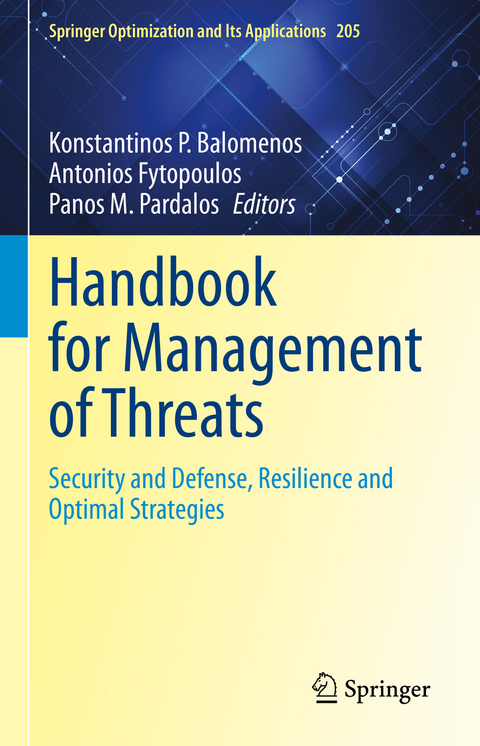
Handbook for Management of Threats
Springer International Publishing (Verlag)
978-3-031-39541-3 (ISBN)
In answer to the unprecedented challenges and threats that face today's globalized world, the primary goal of this Handbook is to identify the most probable threats that have affected humanity in recent years and our world in years to come. The Handbook comprises mostly expository chapters that discuss tested methods/algorithms, case studies, as well as policy decision-making techniques surrounding threats and unnatural disasters, to evaluate their effects on people and to propose ways to mitigate these effects. In several chapters, new approaches and suggested policies supplement algorithms that are already in practice. The curated content brings together key experts from the academic and policy worlds to formulate a guide of principal techniques employed to gain better control over selected types of threats.
This Handbook explores a wide range of technologies and theories and their impact on countering threats. These include artificial intelligence, machinelearning, variational inequality theory, game theory, data envelopment analysis, and data-driven risk analysis. These tools play a vital role in decision-making processes and aid in finding optimal solutions. Additionally, a variety of optimization techniques are employed. These include (mixed) integer linear programming models for identifying critical nodes in complex systems, heuristics, approximation algorithms, and bilevel mixed integer programming for determining the most impactful links in dynamic networks. Furthermore, simulation tools are described that enable the quantification of societal resilience. These techniques collectively provide a mathematical framework capable of quantifying fundamental aspects of threats. They equip policymakers with the necessary tools and knowledge to minimize the impact of unnatural threats.
The expected readership is wide and includes officials working in technical and policy roles in various ministries such as the Ministry of Defense, Civil Protection, Ministry of Public Order and Citizen Protection, United Nations, European Institutions for Threat Management, NATO, Intelligence Agencies, Centers of Excellence for Countering Threats, Think Tanks, Centers for Policy Studies, Political Leaders, the European Commission, National Institutes, International Organizations, Strategic Consulting Experts, Policymakers, and Foreign Affairs personnel. Some of these national or international organizations employ algorithms to measure resilience and enhance security. Quantification is challenging but crucial in the scenarios discussed in the book. This Handbook will also prove valuable to various universities (non-practitioners), studying systems engineering, leadership, management, strategy, foreign affairs, politics, and related disciplines.
lt;b>Konstantinos Balomenos is Political and International Relations scientist and Director General of General Directorate of National Defense Policy & International Relations, Hellenic Ministry of National Defense.
Antonios Fytopoulos is affiliated with the 2nd Airfield Support Battalion, Hellenic Army and professor at the Department of Chemical Engineering, KU Leuven, Belgium. He is also a volume editor for Optimization in Pharmaceutical Processes to publish in 2022.
Panos M. Pardalos serves as distinguished professor of industrial and systems engineering at the University of Florida. Additionally, he is the Paul and Heidi Brown Preeminent Professor of industrial and systems engineering. Professor Pardalos is also an affiliated faculty member of the computer and information science department, the Hellenic Studies Center, and the biomedical engineering program. Additionally, he serves as the director of the Center for Applied Optimization. Professor Pardalos is a world leading expert in global and combinatorial optimization. His recent research interests include network design problems, optimization in telecommunications, ecommerce, data mining, biomedical applications, and massive computing. Panos Pardalos is a prolific author who lectures all over the world. He is the recipient of a multitude of fellowships and awards, the most recent of which is the Humboldt Research Award (2018).
Future threats - creating a resilient society (Fytopoulos).- Managing environmental threats: integrating nature-related risks into investment decisions and the financial system (Kerckhoven).- Defense Critical Supply Chain Networks and Risk Management with the Inclusion of Labor: Dynamics and Quantification of Performance and the Ranking of Nodes and Links (Nagurney).- Facing Shortages - Practical Strategies to Improve Supply Chain Resilience (Kalaitzi).- Critical infrastructure detection during an evacuation with alternative fuel vehicles (Vogiatzis).- Risk assessment and identification methodology for the defense industry in times of crisis - decision making (Sanders).- Quantum Computers - The Need for a New Cryptographic Strategy (Britta).- On the way to coastal community resilience under tsunami threat (Pelinovsky).- Transnational Terrorism as a Threat - Cross border threats (Wright).- Resilience against Hybrid Threats - Empowered by emerging technologies - A study based on Russian invasion of Ukraine (Jasper).- Earthquakes - Management of threats, a holistic approach (Agapaki).- Efficiency Evaluation of Regions' Firefighting Measures by Data Envelopment Analysis (Demin).- Superposition Principle for Tornado Prediction (Aleskerov).- A Network-Based Risk-Averse Approach to Optimizing the Security of a Nuclear Facility (Butenko).- Post-Disaster Damage Assessment by using Drones in a Remote Communication Setting (Balcik).- Identifying critical nodes in a network (Arulselvan).- Machine learning-based rumor controlling (Du).- Strategic Communication as a mean for countering Hybrid Threats (Balomenos).- The Integrated approach in countering contemporary security and defence threats (Bellou).- European Union and NATO Cooperation in Hybrid Threats (Kostarakos).- Hybrid Threats: A European Response (Anagnostakis).- Integrated Development Environment using M&S and AI for Crisis Management E&T (Nikolov).- Civil-Military Cooperation for the countering of threats - Protection of civilians during the development of a threat (Porath).- The Psychological Dynamics of Leadership Amid a Crisis (Pasmore).
| Erscheinungsdatum | 29.12.2023 |
|---|---|
| Reihe/Serie | Springer Optimization and Its Applications |
| Zusatzinfo | XVI, 537 p. 110 illus., 78 illus. in color. |
| Verlagsort | Cham |
| Sprache | englisch |
| Maße | 155 x 235 mm |
| Gewicht | 991 g |
| Themenwelt | Mathematik / Informatik ► Mathematik ► Angewandte Mathematik |
| Schlagworte | beta-disruptor based framework • Civil-Military Cooperation • handbook threat management • (mixed) integer linear programming models • threats artificial intelligence • threats machine learning • β-disruptor based framework |
| ISBN-10 | 3-031-39541-7 / 3031395417 |
| ISBN-13 | 978-3-031-39541-3 / 9783031395413 |
| Zustand | Neuware |
| Haben Sie eine Frage zum Produkt? |
aus dem Bereich


